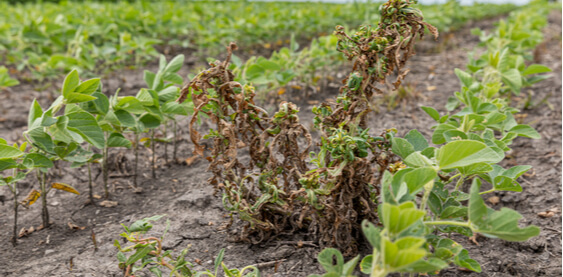
Bayer Announces Settlement of Dicamba Moving Off-Target Litigation
Earlier this week, Bayer announced a mass tort agreement in which it will pay up to $300 million to settle claims resulting from the ongoing dicamba volatility litigation. The multidistrict litigation (MDL), which was consolidated in the Eastern District of Missouri, alleges that dicamba caused damage to soybean and cotton crops in Arkansas and other states in recent years.
Thousands of farmers may be eligible for payments under the terms and conditions of the settlement. Claimants will need to show that that their soybean crops had dicamba damage symptomology and yield loss in order to qualify. The Paul Byrd Law Firm, PLLC has been heavily involved in the dicamba lawsuit, and Mr. Byrd was a member of the MDL’s Plaintiffs’ Executive Committee.
If you are a farmer and your soybean crop sustained damage resulting from dicamba volatility, you may be entitled to significant compensation. Contact the Paul Byrd Law Firm, PLLC today for a free consultation to assess your case.
What is Dicamba?
Dicamba is an herbicide that was first registered for use in the 1960’s and has been formulated under several brand names. In the past, it was used primarily for weed control for grain crops and turf areas. Dicamba has also been used to control brush in pastures, and it has been used in combination with other substances for various purposes.
Use of Dicamba became more widespread when Monsanto (now owned by Bayer) began producing genetically modified cotton and soybean seeds that were dicamba-resistant. Monsanto’s Dicamba, marketed under the brand name XtendiMax, has been prone to move off-target after being applied and affect nearby plants that were not intended to be treated.
In 2015, Monsanto began selling its dicamba-tolerant cotton seed and in 2016, Monsanto began selling its dicamba-tolerant soybean seed. This allowed farmers to use a Dicamba herbicide in conjunction with the company’s Dicamba-tolerant soybean seed (marketed under the brand Xtend) during the growing season. Unfortunately, neighboring farmers who had planted non-Dicamba-tolerant seeds began reporting that their crops were damaged, most likely due to Dicamba moving off-target.
In 2017, Monsanto released a new dicamba formulation that included a feature called Vapor Grip. This feature was designed to cause the herbicide to attach to the plants and prevent it from moving off-target.
Even after the release of XtendiMax with Vapor Grip, there were still widespread occurrences of dicamba moving off-target. Thus, due to this litigation and settlement, Monsanto will pay for soybean crop damage losses that occurred in 2015 through 2020 caused by Dicamba moving off target and affecting soybean crops.
Were Your Crops Damaged by Dicamba? Contact Us to Find Out More about the Dicamba Litigation Settlement
If you had soybean crops from 2015 to 2020 that have been damaged by Dicamba moving off-target, the Paul Byrd Law Firm, PLLC is here to help. Message us online or call our office today at (888) 998-3050 for your free consultation and case assessment.


